Chapter 1 Real Numbers
Class 10th NCERT Maths Book Solution
CBSE Class 10 Maths
NCERT Solution
Real Numbers Exercise Ex. 1.1
Solution 1
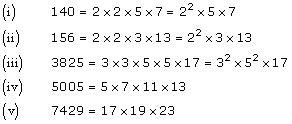
Concept Insight: Since the given number needs to
be expressed as the product of prime factors so in order to solve this problem
knowing prime numbers is required. Do not forget to put the exponent in case a
prime number is repeating.
Solution 2
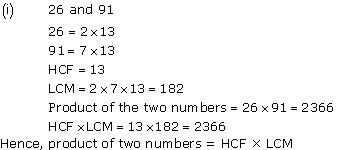
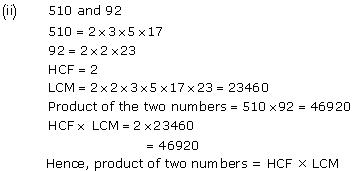
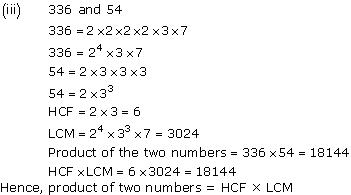
Concept Insight: HCF is the product of common prime
factors raised to least power, while LCM is product of prime factors raised to
highest power. HCF is always a factor of the LCM.
Do not skip
verification product of two numbers = HCF x LCM as it can help in cross checking
the answer.
Solution 3
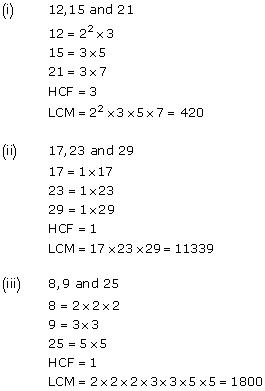
Concept Insight: HCF is the product of common prime
factors of all three numbers raised to least power, while LCM is product
of prime factors of all here raised to highest power. Use the fact
that HCF is always a factor of the LCM to verify the answer. Note HCF of
(a,b,c) can also be calculated by taking two numbers at a time i.e HCF
(a,b) and then HCF (b,c) .
Solution 4
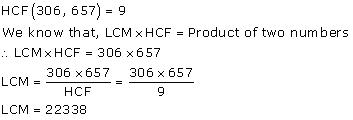
Concept Insight: This problem must be solved using
product of two numbers = HCF x LCM rather then prime factorisation
Solution 5
If any number ends with the digit 0, it should be divisible by 10 or in other
words its prime factorisation must include primes 2 and 5 both
Prime
factorisation of 6n = (2 x 3)n
By Fundamental
Theorem of Arithmetic Prime factorisation of a number is unique. So 5 is not a
prime factor of 6n.
Hence, for any value of n, 6n will
not be divisible by 5.
Therefore, 6n cannot end with the
digit 0 for any natural number n.
Concept Insight: In order solve such problems the
concept used is if a number is to end with zero then it must be divisible by 10
and the prime factorisation of a number is unique.
Solution 6
Numbers are of two types - prime and composite. Prime numbers has only two
factors namely 1 and the number itself whereas composite numbers have
factors other than 1 and itself.
It can be observed that
7 x 11 x 13
+ 13 = 13 x (7 x 11 + 1) = 13 x (77 + 1)
= 13 x 78
= 13 x 13 x 6
The given expression has 6 and 13 as its factors. Therefore, it is
a composite number.
7 x 6 x 5 x 4 x 3 x 2 x 1 + 5 = 5 x (7 x 6 x 4 x 3
x 2 x 1 + 1)
= 5 x (1008 + 1)
= 5 x 1009
1009 cannot
be factorised further. Therefore, the given expression has 5 and 1009 as its
factors. Hence, it is a composite number.
Concept Insight:
Definition of prime numbers and composite numbers is used. Do not miss
the reasoning.
Solution 7
It can be observed that Ravi and Sonia does not take same amount of time Ravi
takes lesser time than Sonia for completing 1 round of the circular path.
As they are going in the same direction, they will meet again at the
same time when Ravi will have completed 1 round of that circular path with
respect to Sonia.
i.e When Sonia completes one round then ravi
completes 1.5 rounds. So they will meet first time at the time which
is a common multiple of the time taken by them to complete 1 round
i.e
LCM of 18 minutes and 12 minutes.
Now
18 = 2 x 3 x 3 = 2 x
32
And, 12 = 2 x 2 x 3 = 22 x
3
LCM of 12 and 18 = product of factors raised to highest exponent =
22 x 32 = 36
Therefore, Ravi and Sonia
will meet together at the starting point after 36
minutes.
Concept Insight: In order to solve the word
problems first step is to interpret the problem and identify what is to be
determined. The problem asks for simultaneous reoccurrence of events so we need
to find LCM. The key word for simultaneous reoccurrence of events is LCM. Do not
forget to write the final answer.
Real Numbers Exercise Ex. 1.2
Solution 1
Let us assume, on the contrary that ![]() is
a rational number.
is
a rational number.
Therefore, we can find two integers a,b (b # 0) such that ![]() =
= ![]()
Where a and b are co-prime integers.

Therefore, a2 is divisible by 5 then a is also divisible
by 5.
So a = 5k, for some integer k.![]()
This means that b2 is divisible by 5 and hence, b is divisible by
5.
This implies that a and b have 5 as a common factor.
And this is a
contradiction to the fact that a and b are co-prime.![]()
Concept
Insight: There are various ways of proving in mathematics proof by
contradiction is one of them. In this approach we assume something which is
contrary to what needs to be proved and arrive at a fact which contradicts
something which is true in general. Key result used here is "If P is a prime
number and it divides a2 then it divides a as
well".
Solution 2
![]()
Therefore, we can find two integers a, b (b ![]() 0) such that
0) such that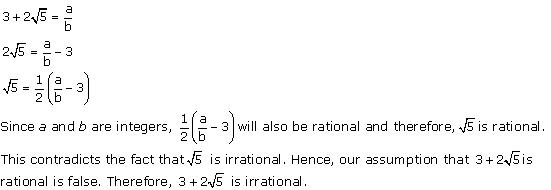
Concept
Insight: This problem is solved using proof by contradiction. The key
concept used is if p is prime number then ![]() is irrational. Do not prove this question by assuming sum of rational and
irrational is irrational.
is irrational. Do not prove this question by assuming sum of rational and
irrational is irrational.
Solution 3
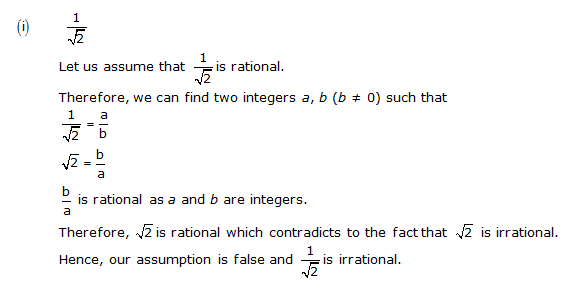
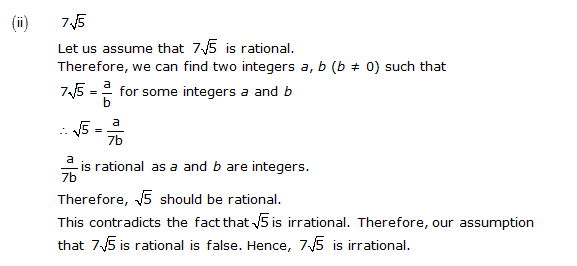
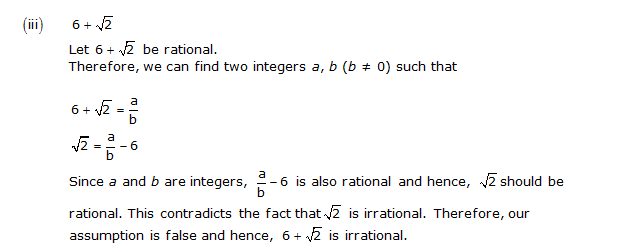
Concept Insight: This problem is
solved using proof by contradiction. The key concept used is if p is prime
number then ![]() is irrational.Do not prove this question by assuming sum or product of rational
and irrational is irrational.
is irrational.Do not prove this question by assuming sum or product of rational
and irrational is irrational.